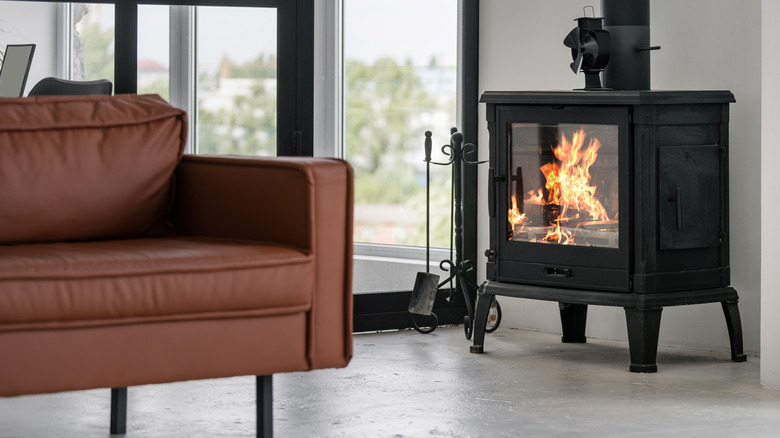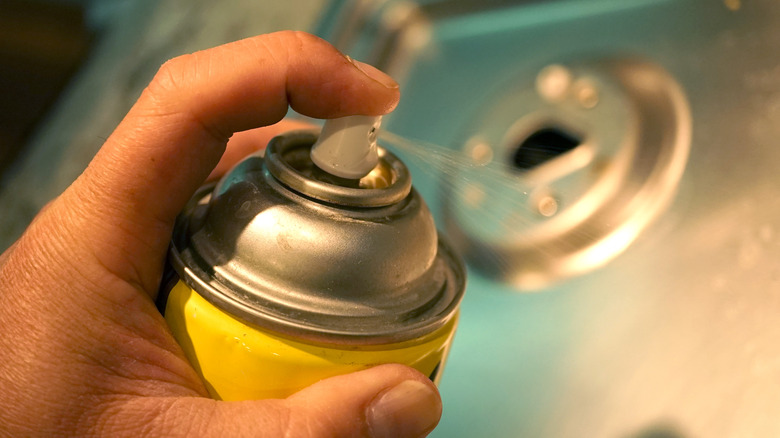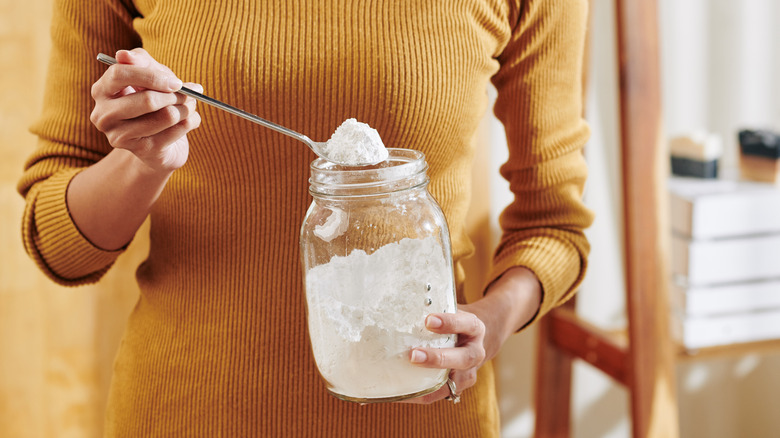Think Twice Before Using This Cleaner To Banish White Film From Fireplace Glass
We may receive a commission on purchases made from links.
Fireplaces might create a cozy mood during the winter, but that ambiance comes with a trade-off. They require a fair amount of upkeep. Not only do you need to sweep your chimneys, remove spent embers and logs, and stay on top of any crumbling mortar joints, but you also have to give your fireplace a good cleaning. If your fireplace has a glass door, it will get dirty with everything from soot to a white haze created by mineral deposits, and it can take quite a bit of muscle power to clean it off. Because of this, you might be tempted to grab a cleaning agent that is known to be harsher and utilizes powerful chemicals to break down grime, such as an oven cleaner. But, you may want to think twice before using a product like that on your fireplace glass. The caustic nature of the cleaner can actually eat away at the glass, ultimately ruining it.
This fact might surprise you, especially if you use your oven cleaner on your oven's glass window — but you shouldn't be using it there, either! Appliance professionals warn against using harsh cleaning solutions on glass since it can damage its surface, making it difficult to replace later. Instead, you should use milder ingredients or a glass cleaner without any caustic chemicals. Let's take a deeper dive into why you should avoid using oven cleaners to clean your fireplace glass.
Why you shouldn't use oven cleaner on fireplace glass
Oven cleaner might at first seem like an easy way to remove white film from your fireplace door due to its strong ingredients. It makes wiping up burnt food and built-up grease easy, so surely it can do the same to soot and white fireplace haze, right? While it will work to clean up the mess, it will also damage the glass. The caustic ingredients in the formula can actually dissolve a thin layer off of your glass door. While it might not be visible to the naked eye at first, it will make the texture uneven, which will create pockets and holes for future soot to settle into, making it even more difficult to clean down the line.
This is because the cleaner is created to be very alkaline, which helps it eat away at grease and food debris. Some cleaners have a pH of 14, for example, which is on the far alkaline end of the pH scale. For reference, anything that has a pH of less than 2 or greater than 12.5 is considered to be corrosive and should be used cautiously. Not only does oven cleaner have a very high pH level, but the product also typically contains ammonia, which can create small etches and marks in the glass after continued use.
How to clean the white haze off instead
Rather than reaching for heavy-duty products that can damage your delicate glass, instead use milder solutions. There are several ways you can go about cleaning the glass. The first is to use a baking soda paste. Mix the baking soda with warm water, adding just enough water to create a thick, slightly abrasive texture. Spread this onto the glass, and use a sponge to work it into the glass. Wipe it clean with warm water to remove the grime, and then wipe it again with a dry microfiber cloth.
A second solution is to simply use vinegar. Spray vinegar onto the glass and then use a microfiber cloth to wipe away the buildup. If the haze doesn't lift with just that, mix in a little bit of ash from the fireplace into the mixture to form a paste and give it a slight abrasive power. Clean the glass like you would with baking soda, wiping it clean with a microfiber cloth. Lastly, use a specially formulated fireplace window cleanser to tackle the white film. Since the formula is made for glass, you will know it's mild enough not to eat away at it. Rutland Fireplace Glass Cleaner, which you can buy for $15 at Home Depot, is a great option.


